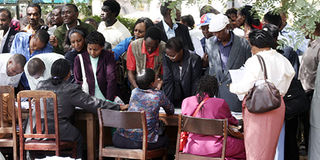Big names linked to Sh34b pyramid cons

Victims of pyramid schemes register with by the task force formed to investigate the dubious investments in which hundreds of families lost billions of shillings. Photo/CHRIS OJOW
Twenty people have killed themselves after being ruined by pyramid schemes which an MP claimed were operated by prominent people. Kenyans lost Sh34 billion in the con games, which MPs said were masterminded by well known persons. Thousands of investors were left destitute with almost two dozen taking their own lives.
Devious scheme
The MPs, speaking under parliamentary privilege, linked former Cooperatives Development minister Njeru Ndwiga, the wife of Trade minister Amos Kimunya, one-time influential State House confidante Stanley Murage, the chairman of the Interim Independent Boundaries Review Commission, Mr Andrew Ligale and Ms Mary Odinga, who once served as an ambassador, to the devious scheme.
Others named by MPs Bonny Khalwale (Ikolomani) and Mithika Linturi (Igambe South) were Mr George Donde, Mr Gideon Mwiti, a Dr Ndamwe and a Mr Zakaria. MPs accused the Government of “protecting” those behind the con schemes and demanded immediate action to ensure that thousands of Kenyans who have been turned into paupers are refunded their money. Said Dr Khalwale: “These individuals were protected by the government.”
However, Cooperative Development minister Joseph Nyaga told the House he could not confirm whether those named by MPs were the masterminds of the fraud. Mr Nyaga, nonetheless, said the names must have come out during the public hearings. “We know as a fact that 20 Kenyans committed suicide and many families separated because of losing their money through pyramid schemes,” he said.
He urged restraint among MPs and Kenyans, and promised to make public the findings of the task force that conducted investigations into the activities of the schemes. The report by the task force, headed by former minister Francis Nyenze, he said, will reveal the full list of the masterminds.
“Just give me two weeks and I will bring a report, since we still have to clarify these issues (of those named by the MPs),” he said. The Nyenze team, formed in February 2008, has toured the country, collecting views and registering victims who lost money in the schemes. Mr Nyaga said the task force had interviewed directors and managers of the collapsed schemes to ascertain the truth regarding the claims made against many of them.
During the public hearings, investors named a former MP, relatives of senior politicians, five prominent law firms and several church leaders as the masterminds of pyramid schemes that collapsed in 2007, leaving many investors penniless. Church leaders were also deeply involved in schemes, the report revealed. “They preached about the schemes in churches and public gatherings using bible quotes of planting a seed to earn more,” said the report.
In particular, the report noted that the Deliverance Church was frequently mentioned in the course of compiling the report. The task force heard painful stories of how investors throughout the country were left destitute or in debt when the schemes collapsed.
Sell the land
One investor told the task force in Nyeri that she had convinced her husband to sell the land on which their matrimonial home stood to put money in one of the schemes expecting huge returns. They lost everything. She said her husband got so depressed that he died. Today, she is a homeless widow with three children.
An Embu pastor recounted how he quit his job in Nairobi to start a branch of a pyramid scheme. In Kisii, a witness told the task force how his family had raised more than Sh400,000 and pumped it into a pyramid scheme. When it collapsed, his relatives were diagnosed with illnesses such as high blood pressure.
The problem for depositors has been that the law is vague on pyramid schemes. When they collapsed in 2007, some investors sought the help of the Kenya Anti-Corruption Commission but the graft body deals with public agencies or officers only and is not mandated to pursue private individuals or institutions.
The investors were advised to seek redress in the courts, where the wheels of justice turn painfully slowly. Though the Central Bank of Kenya and the police instituted several cases against suspected managers of the schemes, no one has been punished for the fraud to date.
The CBK’s Banking Fraud Investigation Unit proved ineffective in preventing the schemes from luring the public with the false promise of quick riches. One of the schemes, Deci Capacity Building Entrepreneurship operated by Mr Donde, is said to have gone down with millions of shillings in deposits.
The Banking Fraud unit took Mr Donde, the chief executive and founder, to court in September 2006 for allegedly carrying out banking business without a licence but the case was later dropped.
Other organisations reported to have taken deposits include Jitegemee, Akiba Micro Finance, Acid, Clip, Sasanet, Kenya Business, Global, Circuit, Swop Silver Ventures and Fino. Akiba has a pending case in court for allegedly receiving deposits without a licence.




